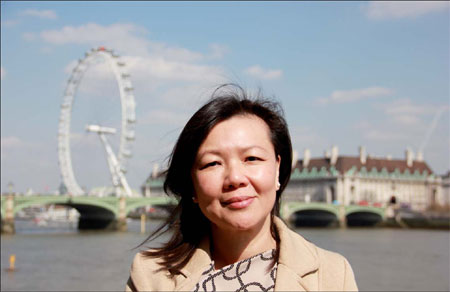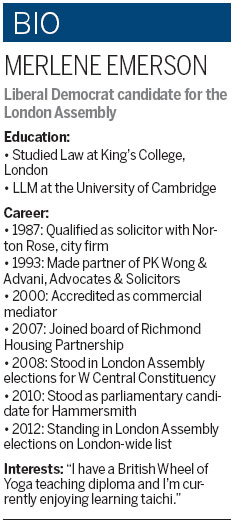London calling
Updated: 2012-04-27 10:39
By David Bartram (China Daily)
|
|||||||||||
 |
|
Merlene Emerson says with the change in China's role in the world, British Chinese have a greater level of self-confidence than before. [Bin Wu / for China Daily] |
Candidate looks for chance to represent capital's British-Chinese community
London's Chinatown is rarely a center of political campaigning, but just a couple weeks before Londoners headed to the polls, one candidate canvassing outside a row of Chinese restaurants was trying to persuade passers-by not just to vote for her, but to vote at all. On May 3, Merlene Emerson will stand for the UK's Liberal Democrat party in London's regional elections. She hopes to become the first ethnic Chinese representative in the London Assembly, a body that holds the city's mayor to account.
Britain's Chinese community has traditionally struggled to gain representation in UK politics. Despite numbering some 400,000, there has never been a Chinese member of parliament and politicians at a local level are few and far between.
"The Chinese in Britain have traditionally stayed out of politics as they have either been first-generation migrants more concerned about making a living, or children of migrants encouraged by parents to pursue a professional career," says Emerson.
"Considering the high risks involved in going into politics and the lack of security or a guarantee of getting elected, it is not surprising that the pragmatic Chinese have shunned politics so far."
Emerson moved to the UK in 1979 from Singapore, studying law, first at King's College, London and then Cambridge University. But it wasn't until she had lived in the country for 25 years that she decided to become a naturalized citizen and get involved in politics.
"I chose the Liberal Democrats as I agreed with their values and prefer a more moderate centrist party compared to the left-wing Labour and right-wing Conservatives. It was also the only major political party in the UK to oppose the Iraq war."
It was not long after joining the party that Emerson identified a problem: unlike their political rivals, the Liberal Democrats did not have a branch dedicated to Chinese members. She set about correcting this, forming the Chinese Liberal Democrats alongside Linda Chung, a local councilor for the party.
"The Chinese Liberal Democrats was established to be a bridge between the party and the Chinese community and to forge a better understanding between the UK and China," says Emerson.
"We have consulted on why the Chinese don't vote as much as other groups and what issues are of concern. Now we are campaigning to address these issues.
"We work in partnership with organizations such as the British-Chinese Project, Citizens UK and Operation Black Vote, as well as with community centers across the country to raise awareness of the importance of the Chinese community getting more active and integrated into mainstream society."
Emerson has also been campaigning alongside the Liberal Democrats' candidate for mayor of London, Brian Paddick. If elected, she pledges to bring the issues that are of concern to the Chinese community into the mainstream agenda. These include immigration, care for the elderly and assistance for small businesses.
One issue of particular interest to Emerson is that of graduate work visas. The UK is home to some 100,000 Chinese students studying at universities across the country. From March this year, the Post-Study Work (PSW) visa was abolished, making it harder for recent or fresh graduates to stay on in the UK to find employment.
Some worry that this might threaten British universities' current status as one of the most popular destinations for overseas Chinese. Students wishing to stay on to work will now be subjected to stricter regulations regarding English-language proficiency and must meet minimum earning criteria.
"I regret that the PSW visa has been phased out, and only hope that the students will still be able to use their summer holidays to find some work experience. If elected, I intend on gathering evidence and lobbying the government to rethink this change of policy.
"Our party has already been working to push for a more flexible immigration policy rather than the knee-jerk reaction pandering to the more right-wing elements of government who want to clamp down on immigration from non-EU countries."
Emerson hopes that by championing their cause, she can count on the votes of those Chinese students who do stay behind and make London their home. In an effort to reach some of these young immigrants, she has looked toward social media to connect.
 |
The Chinese Liberal Democrats' Weibo (a microblog similar to Twitter) account gathered an impressive 2,000 followers in the first two days after it was launched. Emerson is using the account to connect with overseas Chinese students and encourage them to get involved and volunteer in the community. "There has recently been a growing number of Chinese becoming more vocal and standing up on issues, from immigration changes to the proliferation of gambling licenses in Chinatown, but the community as a whole would still welcome more representation in public life."
Finding tangible ways to both help and engage London's Chinese community has become a passion of Emerson's. Earlier this year she helped organize an event to encourage the Chinese community to take up the UK government's offer of free school meals for children from under-privileged families.
Traditionally, the Chinese community has one of the lowest take-up rates in the country, with some speculating this could be down to anything from a dislike of the food to an embarrassment of accepting handouts.
But for every child who claims, schools receive additional funding, so Emerson has been busy urging the community to claim what they are entitled to.
"It is not just about the actual meal. Schools receive 600 pounds (735 euros) a year for every pupil claiming the meals, so it is important everyone signs up. I have been sending out surveys to the Chinese community to try and identify those who might not realize they are eligible."
Should Emerson make it onto the London Assembly, it will be the culmination of a decade's progress in the integration of Britain's Chinese immigrant population. During the past 10 years, political campaigning and lobbying on behalf of the Chinese community has become more common, in part due to the work done by organizations such as the British-Chinese Project.
Academic research has contributed to the process. Emerson is working alongside Dr Bin Wu at Nottingham University's China Policy Institute to explore new ways of engaging the Chinese community with different aspects of society. But the community ultimately still lacks high-level representation.
"I would say that with the change in China's role in the world, British-Chinese have a greater level of self-confidence than before. The news is no longer about illegal immigrants being smuggled into the country; it's now about China's economic growth.
"That sort of thing is changing public perceptions. We need to show that British-Chinese people can play a role here. We have an understanding of China and can help Britain build ties."
Emerson will be hoping that after May 3, she'll be in a position to build these ties from the London Assembly.
For China Daily
Today's Top News
Rescuers race against time for quake victims
Telecom workers restore links
Coal mine blast kills 18 in Jilin
Intl scholarship puts China on the map
More bird flu patients discharged
Gold loses sheen, but still a safe bet
US 'turns blind eye to human rights'
Telecom workers restore links
Hot Topics
Lunar probe , China growth forecasts, Emission rules get tougher, China seen through 'colored lens', International board,
Editor's Picks

|

|

|

|

|

|





